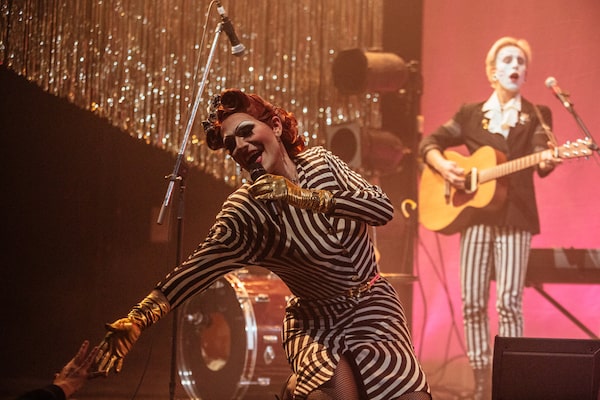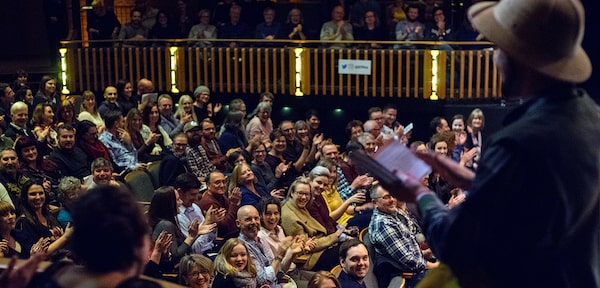
Justin Miller stars as Pearle Harbour in 'Agit-Pop!' The tour group received an email notifying them that their shows had been cancelled due to COVID-19.Tanja-Tiziana/Handout
Justin Miller, who performs as his drag alter-ego Pearle Harbour, was rehearsing his show Agit-Pop! with his musical director in Toronto when they got a call from their artistic producer in Whitehorse. Check your e-mail, she said.
It had already been a rough few days: Every stop on their coming tour had been cancelled because of COVID-19. But there was still the High Performance Rodeo in Calgary.
They checked their e-mail: The HPRodeo was off too.
No longer surprised by a cancellation, Mr. Miller felt what he describes as a certain kind of numbness. But also empathy.
“I can only imagine the turmoil that led to this decision and completely sympathize with it,” he says. And he believes presenters made the right call. “This is the correct thing to happen for the safety of audiences, for the safety of artists, for the safety of arts workers. We’re still grappling with this intense fallout. … It’s ending so many lives – in theatre, at least.”
It was just a few weeks ago that two major winter performing arts festivals in Western Canada announced their return to full, in-person programming for early 2022. The HPRodeo was to begin Jan. 18; the PuSh International Performing Arts Festival in Vancouver two days later. Nobody was declaring the pandemic over, but with vaccinations, safety precautions – and huge desire – the return to live theatre felt possible and exciting.
“We’re bursting to share space with audiences and artists again, and to do it in the safest way possible,” says HPRodeo producer Oliver Armstrong in a media release issued Dec. 1. “Burn your iPads. Put your winter coats on. Wear your mask. We’re back, baby.”
But so was another wave of COVID-19. As Omicron surged, these two festivals – both multidisciplinary experimental envelope-pushers – and both in provinces that have (as of now) not mandated the closing of theatres – were presented with a difficult decision: To be or not to be?
“Even being used to surprises, we were not prepared for this one,” Mr. Armstrong says. They had been preparing for a year. “We went full bore into a planning cycle to do live, full capacity venues.”
Over Christmas break, it became clear that Omicron might disrupt those plans. Back to work, over an intense 24-hour period, HPRodeo organizers called venues, funders and artists, to hear what they were thinking.
In some ways, being ordered to shut down when restrictions were announced might have been easier, Mr. Armstrong says.
Going ahead with some of the events – deciding what to cut, what to keep – felt too complicated. Then there was the health and safety factor. They worried about the toll holding the festival in these circumstances could have on the mental health of talent, staff, volunteers – and audiences.
“It felt odd to welcome people into something that is potentially harmful,” says HPRodeo artistic director Blake Brooker. “It felt like I wasn’t making the decision; it felt like it was reality inserting itself. It felt like: What right do you have to put people at risk?”

The High Performance Rodeo festival in Calgary has been cancelled due to the Omicron variant of COVID-19.Elise Bouvier/Courtesy of manufacturer
There were also financial considerations: What if they continued to pour money into these shows, only to have to ultimately cancel? “You have to refund the tickets anyway,” Mr. Armstrong says. “That’s kind of the worst position to be in, because we’ve spent everything and recouped nothing.”
The board agreed late on Friday Jan. 7 to cancel the festival outright; the news was relayed to people involved. First thing Monday, the decision was announced publicly. The box office began tracking down patrons and offering refunds – and asking whether they might consider donating the cost of the ticket. Tuesday morning the HPRodeo team gathered for its regular Zoom meeting. People talked about feeling relieved, sad and angry at the world. The disappointment was universal.
“When you work this hard to bring this to life and you don’t have that chance, it can be devastating,” Mr. Armstrong says. “As theatre folks who have lived by the adage ‘the show must go on,’ it’s a very different headspace when the show can’t go on.”
In Vancouver, PuSh – also looking at rising Omicron numbers – has taken a different path. Here the show – at least, most of the shows – will go on. (So far, anyway.)
When asked this week if the festival had, like the Rodeo, considered cancelling, PuSh director of programming Gabrielle Martin was emphatic.
“We have not thought about it,” Ms. Martin says. “I think it has to do with our belief that art is essential. And our integrity to the artists and arts workers and patrons and our sense of commitment and responsibility to them. Not to say that other presenters don’t have that integrity.”
For PuSh, the in-person festival this year was not just a return after the pandemic lockdown, but a resurfacing after a turbulent period that saw the departure of key leaders, backlash from the PuSh community, and the creation of a new leadership model.
Ms. Martin joined PuSh last September as part of the three-person collaborative leadership team. In late October, she travelled to Europe for a research trip, preparing for PuSh 2023. There she found herself in venues at full capacity, no masks required. “At first it was a little bit disorienting or a little uncomfortable or just strange, but then it was really a joy,” she says. She loved that feeling of communion, of shared humanity. “And I was really looking forward to a similar kind of experience for patrons at PuSh.”
Not long after she returned, the joy began to diminish as Omicron escalated. Ms. Martin herself contracted COVID-19 over the holidays.
“To be honest,” she says, “there was a little bit of a sense of doom opening up the new year. However, I believe that part of my job is to champion art and champion the festival.” After years performing with Cirque du Soleil, she knows what it’s like to feel like you just can’t go on, and then go on anyway.
There have been some necessary adjustments. Venues are being sold to 50-per-cent capacity in accordance with government restrictions. If limits are lifted before the festival begins, PuSh will go to 75 per cent – but not full houses.
Two shows – The Café and Songs for a Lost Pod, a world premiere – were cancelled, as was the closing night party, typically a wild bash in the before times.
But they’ve also added some pandemic-era innovations, including three shows that can be streamed. And patrons can buy out performances of Ruby Singh’s Vox.Infold for their own bubble of 10.
The PuSh offices, usually buzzing at this time of year, are pretty quiet, but the work continues – not just for next week, but for next year too. Whatever that looks like.
In Calgary, the HPRodeo may still go on, in some form, later this year. Doing so would allow Jean Grand-Maître to present the world premiere of The Memory Room during his final season at Alberta Ballet. The outgoing artistic director created the show with three dancers and pianist Kevin Chen, the Calgary-based prodigy who won first place at the Franz Liszt International Piano Competition last year.
“It was kind of a goodbye to dance, remembering moments in my career and then working with these three muses who played such an important part of my career,” says Mr. Grand-Maître, who is retiring after 20 seasons with the company.
What’s happening on Canada’s stages and in its rehearsal halls – or not happening – is about more than these few shows, these two festivals, this group of artists. It speaks to how precarious things are for the performing-arts ecosystem, in particular the independent artists at its heart, trying to navigate the stop-start of the pandemic.
“Every time that happens, dozens upon dozens of producing hours, of rehearsal hours are lost to the wind,” Mr. Miller says. Even if the shows are rebooked, all kinds of extra planning, paperwork and artistic work becomes necessary. “The money we’re actually walking away with for the hours that we put in just shrinks and shrinks and shrinks.”
Mr. Miller is fortunate; he is beginning an internship with Tarragon Theatre. “If it were not for that, good God, I’d be so skunked,” he says. “It is hard to imagine how much longer we can do this. And how much longer we can keep being told to just hold on.”
He predicts a lot of attrition – people leaving the arts. “And I don’t yet know if I’ll be among them.”
The PuSh International Performing Arts Festival runs Jan. 20 – Feb. 6.
Keep up to date with the weekly Nestruck on Theatre newsletter. Sign up today.
 Marsha Lederman
Marsha Lederman